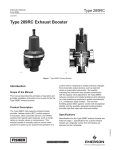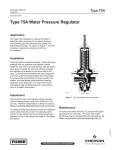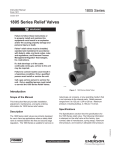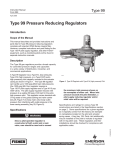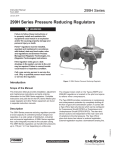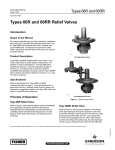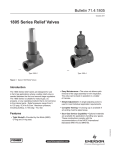Download Emerson 122A Instruction Manual
Transcript
Type 122A Instruction Manual Form 2279 March 2013 Type 122A Three-Way Switching Valve ! WARNING Failure to follow these instructions or to properly install and maintain this equipment could result in an explosion, fire and/or chemical contamination causing property damage and personal injury or death. Fisher® switching valves must be installed, operated, and maintained in accordance with federal, state, and local codes, rules and regulations, and Emerson Process Management Regulator Technologies, Inc. (Regulator Technologies) instructions. If the switching valve vents gas or a leak develops in the system, service to the unit may be required. Failure to correct trouble could result in a hazardous condition. Installation, operation, and maintenance procedures performed by unqualified personnel may result in improper adjustment and unsafe operation. Either condition may result in equipment damage or personal injury. Only qualified personnel shall install, operate, and maintain the Type 122A three-way switching valve. Introduction Scope of the Manual Figure 1. Type 122A Three-Way Switching Valve Description The Type 122A three-way switching valve (see Figure 1) is a high-capacity, economical three-way pneumatic switching valve for on-off applications. This valve can be used for diverging or converging gaseous service, diverging liquid service with gas-loaded liquids, and converging liquid service. Six spring ranges are available for control pressures from 3 to 150 psig / 0.21 to 10.3 bar. D100263X012 This instruction manual includes installation, adjustment, maintenance, and parts ordering information for the Type 122A three-way switching valve. W3141-1 www.fisherregulators.com Type 122A Specifications The Specifications section lists the specifications for Type 122A three-way switching valve. Factory specification is stamped on the nameplate fastened on the valve at the factory. Maximum Inlet Pressure(1) 150 psig / 10.3 bar Flow Coefficients Cg(2) Connection A to B: 138 Connection A to C: 131 Set Pressure Ranges(1) See Table 1 Maximum Control Pressure to Diaphragm(1) 150 psig / 10.3 bar C1 Connection A to B: 28.0 Connection A to C: 32.5 Temperature Capabilities(1) -20 to 150°F / -29 to 66°C Control Connection 1/4 NPT Approximate Weight 5 pounds / 2.3 kg 1. The pressure/temperature limits in this Instruction Manual and any applicable standard or code limitation should not be exceeded. 2. At an inlet pressure of 25 psig / 1.7 bar and with full pressure drop across the body. Table 1. Set Pressure Ranges SET PRESSURE RANGES PRESSURE BUILD-UP ABOVE SETPOINT REQUIRED FOR FULL STROKE SPRING WIRE DIAMETER SPRING FREE LENGTH SPRING PART NUMBER SPRING COLOR psig bar psi bar Inches mm Inches mm 3 to 15 5 to 20 5 to 35 0.21 to 1.0 0.35 to 1.4 0.35 to 2.4 10 13.5 22 0.69 0.93 1.5 0.168 0.187 0.218 4.27 4.75 5.54 2.94 2.81 2.50 74.6 71.4 63.5 1D892327022 1D751527022 1D665927022 Red Cadmium Blue 30 to 60 40 to 100 60 to 150 2.1 to 4.1 2.8 to 6.9 4.1 to 10.3 30 54 66 2.1 3.7 4.6 0.234 0.283 0.240 5.94 7.19 6.10 2.57 2.31 2.63 65.2 58.7 66.8 1D7455T0012 1E543627142 1P901327142 Green Yellow Brown Principle of Operation Refer to Figure 2. The flow through the Type 122A valve is normally from port A to C, with the spring force holding the valve plug down on port B (diverging service). As the pressure under the diaphragm is increased through port D, it acts against the force of the spring. When the control pressure overcomes the force of the spring, the valve begins to stroke, opening port B. Once the pressure under the diaphragm reaches 2 setpoint plus build-up, the valve completes its stroke and the port C seat ring is closed. The valve will only fully stroke when build-up above setpoint is achieved. The point at which the valve completes its stroke and the pressure change necessary to do this are dependent on the spring rate and the set point chosen. The set pressure is easily changed by adjusting the screw at the top of the valve. Type 122A ADJUSTING SCREW SPRING STEM DIAPHRAGM PORT D UPPER VALVE SEAT PORT A PORT C VALVE LOWER VAVE SEAT W0157 INLET PRESSURE OUTLET PRESSURE ATMOSPHERIC PRESSURE INLET PRESSURE INLET PRESSURE PORT B OUTLET PRESSURE OUTLET PRESSURE ATMOSPHERIC PRESSURE ATMOSPHERIC PRESSURE Figure 2. Type 122A Three-Way Switching Valve Operational Schematic 3 Type 122A Installation ! ! WARNING To avoid personal injury or equipment damage caused by bursting of pressure-retaining parts or explosion of accumulated gas, do not exceed the pressure or temperature limits in Specifications, and do not use the Type 122A valve for installations where water hammer can be experienced. 1. The switching valve may be installed in any position. Position the vent (key 29, Figure 3) so that the vent opening is facing downward. Protect the vent opening against the entrance of moisture or any other material that could plug the vent. 2. Apply pipe compound to external pipeline threads. Connect piping to the body connections. 3. Connect the control pressure line to the 1/4 NPT connection in the lower diaphragm case. Overpressure Protection Type 122A three-way switching valves have maximum outlet pressure ratings that are lower than their maximum inlet pressure ratings. A pressurerelieving or pressure-limiting device is needed if inlet pressure can exceed the maximum outlet pressure rating. Overpressuring any portion of a switching valve or associated equipment may cause leakage, parts damage, or personal injury due to bursting of pressure-containing parts or explosion of accumulated gas. Switching valve operation within ratings does not preclude the possibility of damage from external sources or from debris in the pipeline. A switching valve should be inspected for damage periodically and after any overpressure condition. Startup and Adjustment Key numbers is referenced in Figure 3. 1. With proper installation completed and downstream equipment properly adjusted, slowly open the upstream and downstream shutoff valve (when used) while using pressure gauges to monitor pressure. 4 WARNING To avoid personal injury, property damage, or equipment damage caused by bursting of pressure containing parts or explosion of accumulated gas, never adjust the control spring to produce an outlet pressure higher than the upper limit of the outlet pressure range for that particular spring. If the desired outlet pressure is not within the range of the control spring, install a spring of the proper range according to the diaphragm parts maintenance procedure. 2. Refer to the nameplate (key 25, Figure 3) for the spring range. To change the spring setting, loosen the locknut (key 30, Figure 3), and rotate the adjusting screw (key 7, Figure 3). Rotating the adjusting screw clockwise into the spring case (key 1, Figure 3) increases the control pressure at which the valve switches. Rotating the adjusting screw counterclockwise decreases the switching pressure. Maintenance Parts are subject to normal wear and must be inspected and replaced periodically. The frequency of parts inspection and replacement depends upon the severity of service conditions. Instructions are given below for complete disassembly and assembly. Disassemble the valve only as far as needed. Then, begin the “Assembly” procedure at the appropriate step. Key numbers used in these procedures are shown in Figure 3. ! WARNING To avoid personal injury and equipment damage caused by sudden release of process pressure or uncontrolled process fluid, isolate the valve from all pressure, and release all pressure from the valve body and diaphragm casing before attempting maintenance. Type 122A Disassembly 1. Loosen the locknut (key 30). Rotate the adjusting screw (key 7) counterclockwise until all compression has been relieved from the spring (key 3). 2. Disconnect piping from the bottom connector (key 36). Unscrew and remove the bottom connector. 3. To remove the lower seat ring (key 37), insert a hexagonal bar into the seat ring hole, and use the bar to unscrew the seat ring. The hexagonal hole in the seat ring is 7/16-inch / 11 mm across the flats. 4. Unscrew and remove the spring case cap screws and nuts (keys 26 and 4). Remove the spring case, upper spring seat, and spring (keys 1, 31, and 3). 3. Install the washer (key 17) and three felt washers (key 18) into the valve end of the diaphragm case. Replace the guide bushings (key 15) in each end of the diaphragm casing. Carefully insert the stem (key 5) through the diaphragm casing to be sure the parts are aligned. Attach the washers (key 14) with self-tapping screws (key 16). Remove the stem. 4. Replace the body gasket and snap ring (keys 21 and 20). Secure the diaphragm case to the body with the union nut (key 19). 5. Coat the threads on the valve end of the stem with high strength threadlocker. Attach the disk holder assembly (key 22) to the stem. Carefully install the stem through the opening of the body. 5. Unscrew the hex nuts (key 4) from the stem (key 5). Remove the spring guide, diaphragm head, diaphragm, O-ring, back-up ring, and washer (keys 6, 8, 9, 12, 13, and 10). 6. Screw two hex lock nuts onto the stem. Install the back-up ring, washer, O-ring, diaphragm, diaphragm head, and spring guide (keys 13, 10, 12, 9, 8, and 6). Secure with two hex lock nuts (key 4). 6. Unscrew the remaining hex nuts from the stem, and pull the disk holder assembly (key 22) and attached stem out through the bottom opening. 7. Set the spring and spring seat (keys 3 and 31) onto the spring guide. Attach the spring case with cap screws in a crisscross pattern. 7. Remove the disk holder from the stem. 8. Screw the lower seat ring (key 37) into the bottom connector (key 36). Install the bottom connector into the body. 8. Disconnect the control line from the diaphragm case (key 2). Unscrew the union nut (key 19), and remove the diaphragm case, snap ring (key 20), and body gasket (key 21) from the body (key 23). 9. Unscrew the self-tapping screws (key 16) from each end of the diaphragm case. Remove the washers and guide bushings (keys 14 and 15). 10. Remove the O-ring and back-up rings (keys 12 and 13) from the diaphragm end of the diaphragm case, and remove the felt washers, flat washer, O-ring, and back-up rings (keys 18, 17, 12, and 13) from the valve end of the diaphragm casing. 11. Use a thin-wall socket wrench to remove the upper seat ring (key 24). 9. Re-connect piping to the bottom connector and to the control connection in the diaphragm casing. 10.Adjust the spring by following the “Adjustment” instructions. Parts Ordering When corresponding with your local Sales Office about this valve, mention the serial number and all other data stamped on the nameplate. When ordering replacement parts, also state the complete 11-character part number of each part required as found in the following parts list. Assembly 1. Screw the upper seat ring (key 24) into the body (key 23). 2. Install the back-up rings and O-rings (keys 13 and 12) into each end of the diaphragm case (key 2). 5 Type 122A Parts List Key Description Part Number 1 Spring Case, Aluminum 2P901508012 2 Lower Diaphragm Case, Cast iron 2L918419012 3 Spring See Table 1 4 Hex Nut, Plated steel (12 required) 1A3915X0022 5* 1R177435162 Stem, 316 Stainless steel 6 Spring Guide, Plated steel 1D666625072 7 Adjusting Screw, Plated steel 1D995448702 8 Diaphragm Plate, Plated steel 1D666428982 9* Diaphragm, Neoprene (CR) 1D666302102 10 Key 20 Description Snap Ring, Plated steel 1A832504032 22* Disk Holder Assembly Aluminum/Nitrile (NBR) Stainless steel/Nitrile (NBR) Stainless steel/Fluorocarbon (FKM) 1R1772000A2 1R1772X00A2 1R1772X0032 23 Body, Cast iron 3/4 NPT 1 NPT WCC Steel 3/4 NPT 1 NPT 25 1E472706992 13* Back-up Ring, Leather (5 required) 28 Drive Screw, Plated steel (4 required) 14B0155X012 14 Retaining Washer, Stainless steel (2 required) 1K786935022 15* Guide Bushing, Iron (2 required) 1K787021052 16 Self-Tapping Screw, Plated steel (4 required) 1J336928982 17 1K787135022 1K787206992 19 Union Nut, Ductile iron 1E471119062 *Recommended spare parts 6 1E162622012 1K886222012 1B810309012 1B8103X0012 Name Plate 1D716228982 Washer, Stainless steel 1D3124X0022 1D3125X0022 24* Upper Valve Seat Aluminum Stainless steel 12* O-Ring, Nitrile (NBR) (3 required) 18* Washer, Neoprene (CR)/Felt (3 required) 1A832648722 21 Body Gasket, Asbestos 26 Cap Screw, Plated steel (8 required) Washer, Plated steel Part Number ----------1B720924052 1E501728982 29 Vent Assembly 30 Locknut, Zinc-plated steel 1D667728982 31 Upper Spring Seat, Plated steel 1D667125072 36 Bottom Flange, Plated steel 1 R177524092 37* Lower Valve Seat Aluminum Stainless steel WCC Steel 3/4 NPT 1 NPT EMY602X1-A12 1R177309012 1R1773X00A2 1E162622012 1K886222012 Type 122A 7 30 1 31 3 28 5 4 29 8 9 4 10 15 12 14 13 13 2 20 19 21 A 24 C 6 26 16 12 17 18 22 23 37 25 36 B 20A9801-A A2606 Figure 3. Type 122A Three-Way Switching Valve Assembly 7 Type 122A Industrial Regulators Natural Gas Technologies TESCOM Emerson Process Management Regulator Technologies, Inc. Emerson Process Management Regulator Technologies, Inc. Emerson Process Management Tescom Corporation USA - Headquarters McKinney, Texas 75069-1872, USA Tel: +1 800 558 5853 Outside U.S. +1 972 548 3574 USA - Headquarters McKinney, Texas 75069-1872, USA Tel: +1 800 558 5853 Outside U.S. +1 972 548 3574 USA - Headquarters Elk River, Minnesota 55330-2445, USA Tels: +1 763 241 3238 +1 800 447 1250 Asia-Pacific Shanghai 201206, China Tel: +86 21 2892 9000 Asia-Pacific Singapore 128461, Singapore Tel: +65 6770 8337 Europe Selmsdorf 23923, Germany Tel: +49 38823 31 287 Europe Bologna 40013, Italy Tel: +39 051 419 0611 Europe Bologna 40013, Italy Tel: +39 051 419 0611 Chartres 28008, France Tel: +33 2 37 33 47 00 Asia-Pacific Shanghai 201206, China Tel: +86 21 2892 9499 Middle East and Africa Dubai, United Arab Emirates Tel: +971 4811 8100 For further information visit www.fisherregulators.com The Emerson logo is a trademark and service mark of Emerson Electric Co. All other marks are the property of their prospective owners. Fisher is a mark owned by Fisher Controls International LLC, a business of Emerson Process Management. The contents of this publication are presented for informational purposes only, and while every effort has been made to ensure their accuracy, they are not to be construed as warranties or guarantees, express or implied, regarding the products or services described herein or their use or applicability. We reserve the right to modify or improve the designs or specifications of such products at any time without notice. Emerson Process Management Regulator Technologies, Inc. does not assume responsibility for the selection, use or maintenance of any product. Responsibility for proper selection, use and maintenance of any Emerson Process Management Regulator Technologies, Inc. product remains solely with the purchaser. ©Emerson Process Management Regulator Technologies, Inc., 1980, 2013; All Rights Reserved









